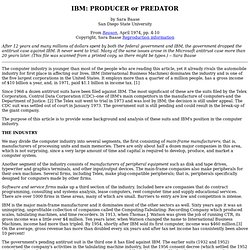

The new open-source economics. Four principles for the open world. The new power of collaboration. Intellectual Property and Licensing. IBM's Crafty Intellectual Property Strategy. IBM came up during a discussion at the Salzburg Global Seminar, a five-day conference in Austria on new models in intellectual property.

IBM is known, of course, for innovation. That may be best reflected in the number of patents it nabs: The company has ranked first in the world for the last 15 years, with more than 3,100 last year alone. But IBM, according to one of the seminar’s co-chairmen, is just as creative in the inventions it gives away. The generosity may make IBM look like a good guy championing the open source movement. Good PR or altruism is beside the point, however. IBM files for patents on its core discoveries, like all tech biggies. While that may seem against IBM's self-interest--you can't license technology you don't own--it's actually not, Kong added. He used an this analogy: Say IBM is the first to invent the chair. But why not patent everything and gain the rights to royalties from product extras? Here's part of my interview with Kong in Salzburg: Conquest By Patents. Where the business of government has indeed become Business, it is difficult to hear the voices that still question the 'need' to be globally competitive, the wisdom of unrelenting market penetration, or the true cost of a revolving employment door between industry and government.

Where commerce is king, a regulator suddenly becoming executive in the industry he used to regulate, or a trade representative being appointed to the board of directors of a company his negotiations greatly benefited, hardly merits media attention. Ethics, in such a climate, inevitably falls on hard times. In 1992, I attended a conference in Seattle about 'The Future of Intellectual Property Protection for Biotechnology in the United States, Europe, and Japan'. For three days eminent speakers discussed patents. Critics say IBM patent giveaway is not enough. By Ann Bednarz, Network World Fusion | Network World US | Published: 11:00, 17 January 2005 IBM last week unlocked access to 500 of its software patents for the open source community, generating mixed reactions from industry watchers.

While IBM's move could help users get new open source products faster by removing development roadblocks, open source advocates and patent watchers ultimately would like to see companies such as IBM change their overall software patenting strategies. At the centre of the issue is current US patent practice, which grants what critics say are overly broad patents on trivial or abstract processes. The quagmire of patents that developers have to weed through to avoid infringement is unmanageable, and the result for corporate users is slower product innovation and delays in standards progress.
"I say, thanks very much. Of course, it's not all sacrifice for IBM. IBM doesn't deny that. Not everyone sees any benevolence in IBM's move. IBM: PRODUCER or PREDATOR. By Sara Baase San Diego State University From Reason, April 1974, pp. 4-10 Copyright, Sara Baase Reproduction information After 12 years and many millions of dollars spent by both the federal government and IBM, the government dropped the antitrust case against IBM.

It never went to trial. The computer industry is younger than most of the people who are reading this article, yet it already rivals the automobile industry for first place in affecting our lives. Since 1968 a dozen antitrust suits have been filed against IBM. The purpose of this article is to provide some background and analysis of these suits and IBM's position in the computer industry. We may divide the computer industry into several segments, the first consisting of main-frame manufacturers; that is, manufacturers of processing units and main memories.
Software and service firms make up a third section of the industry. A specific business ecology. Over the last few years, China and India have emerged as the twin hot spots of emerging tech innovation.

Now IBM (IBM) is betting that one of the next big technology stars will be Brazil. In the latest sign of Brazil's rising power, Big Blue is announcing on Aug. 18 a new initiative to stimulate the development of the country's technology sector. To kick off the effort, IBM is hosting its first-ever forum for venture capitalists and entrepreneurs in São Paulo along with FINEP, the Brazilian government agency that finances technology development. The daylong event will bring together more than 100 investors and dozens of new companies looking for investment and business advice.
IBM is also launching a Portuguese version of its developerWorks Web site, which provides free programs and online teaching guides that help programmers build skills in the Java programming language, the Linux operating system, and IBM products such as Lotus.